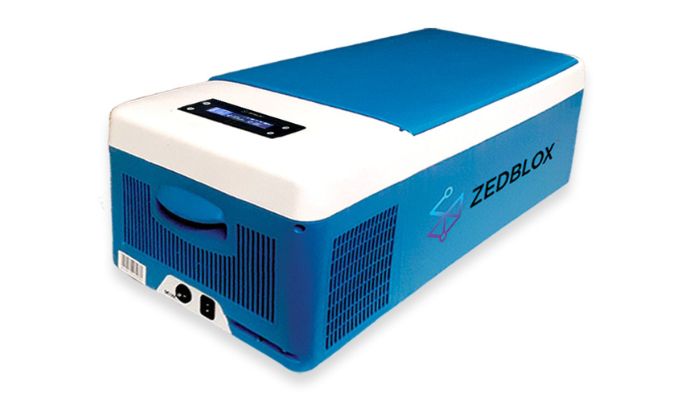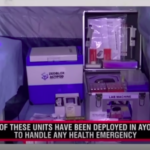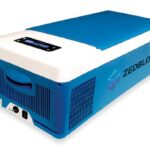The pharmaceutical sector is in charge of developing and distributing life-saving pharmaceuticals to people all over the world. Many of these pharmaceuticals, however, are temperature-sensitive and must be kept at specific temperatures along the supply chain to ensure their efficacy and safety. This is where cold chain logistics, which is critical in the pharmaceutical business, comes in.
The process of shipping temperature-sensitive products, such as vaccines, biological products, and other medications, in a temperature-controlled environment is referred to as cold chain logistics. This ensures that the items stay within the required temperature range from manufacturing to delivery and finally to end customers.
The COVID-19 pandemic has brought the pharmaceutical industry to the forefront of global attention, and with good reason. The industry has been working tirelessly to produce vaccines and medications to prevent and treat the virus. However, the pandemic is not the only factor driving the growth of the cold chain logistics market.
Many drugs that prevent chronic and lifestyle-related diseases have seen a surge in demand. Over-the-counter medications like vitamins, minerals, and cough and cold treatments are now more popular than ever. People are also more focused on finding permanent solutions to these illnesses, which puts pressure on the pharmaceutical industry to create and deliver effective treatments. But these disease-preventing solutions require careful storage and transport. They must be kept at a constant temperature and follow specific protocols for the cold chain management. Failure to do so can compromise the efficacy of the drugs and put patients’ health at risk.
The success of the pharmaceutical industry depends on effective cold-chain logistics. With the growing demand for disease-preventing drugs, it is critical to maintaining proper storage and transportation of medications. This ensures that patients receive the drugs they need to live healthy lives.
Types of Pharmaceuticals Delivered Worldwide
The pharmaceutical industry has always been an essential sector, and the COVID-19 pandemic has highlighted its importance even more. The resumption of international trade has allowed the industry to move products globally, and it is now easier than ever to transport medicines, active pharma ingredients (APIs), and other pharmaceutical products worldwide. However, the safe and secure delivery of these items is critical and poses a significant challenge due to various factors such as temperature, humidity, and light exposure.
From over-the-counter medicines to biological products, pharmaceutical products come in different forms that need to be packaged and labeled with care before being shipped to their final destination. Ointments, liquids, and solids are the most common types of pharmaceuticals received worldwide, and they are often classified based on their form. Spirits, elixirs, and tinctures belong to the liquid category, while creams and pastes are classified as ointments. Solids, on the other hand, consist of pills, tablets, and lozenges.
Unfortunately, many pharmaceutical products are damaged during transport, which can result in significant financial losses for the industry. According to a study published in the journal ‘Pharmacy and Therapeutics,’ it is challenging to determine the exact number of drugs that are ruined during transport.
Cold chain transport is a process that ensures the safe and efficient transportation of temperature-sensitive pharmaceutical products from one location to another. This process is critical in maintaining the integrity and effectiveness of pharmaceuticals, particularly those that require specific temperature ranges. In this article, we will delve into the types of pharmaceuticals that require cold chain transport. Some of the pharmaceutical items that use cold chain logistics include:
Biological Products
Biological products are one of the most sensitive pharmaceutical products that require cold chain transport. These products are derived from living cells, tissues, or organisms and include vaccines, blood, allergens, genes, and tissues. Biological products are used to prevent, diagnose, and treat various medical conditions, including cancer, autoimmune disorders, and infectious diseases.
Biological products require strict temperature control throughout the transportation process, as exposure to temperature fluctuations can lead to the degradation of the product’s efficacy. The temperature range for transporting Biological products is usually between 2°C to 8°C, and any deviation from this range can lead to the product’s spoilage.
Vaccines
Vaccines are crucial for the prevention and eradication of infectious diseases. However, vaccines are also one of the most sensitive pharmaceutical products that require cold chain vaccine carriers. The vaccines must maintain their potency and efficacy, and any temperature fluctuations can lead to their degradation.
The recommended temperature range for transporting vaccines is between 2°C to 8°C, and any deviation from this range can lead to the product’s spoilage. The transportation process for vaccines involves careful monitoring of the temperature, from the manufacturer’s facility to the final destination, including during loading, unloading, and storage.
Specialty Drugs
Specialty drugs are complex medications used to treat chronic and rare medical conditions, such as cancer, multiple sclerosis, and rheumatoid arthritis. These drugs require special handling, storage, and transportation conditions.
Specialty drugs are often expensive, and any damage or degradation during transportation can result in significant financial losses. The recommended temperature range for transporting specialty drugs varies depending on the product. Some require refrigeration, while others require freezing temperatures.
In addition to temperature control, specialty drugs require protection from light exposure, humidity, and shock during transportation. The packaging and labeling of specialty drugs are critical in ensuring their safe and efficient transportation.
Tackling the Challenges of Transporting Temperature-Sensitive Pharmaceuticals
Pharmaceutical products that are highly temperature sensitive tend to become less effective or toxic if not stored and transported properly. Products in this category are stored and transported at -20°C or below. Medications that fall under this category can become ineffective or even hazardous if they thaw out while in transit.
Transportation of pharmaceuticals that require chilled or frozen conditions is a complex process. It involves a number of stakeholders such as pharmaceutical companies, logistics providers, and healthcare providers, and requires coordination between them. The transportation process needs to be carefully managed at each stage to ensure that products are maintained within the specified temperature range.
One of the biggest concerns faced by the cold chain logistics industry is maintaining the temperature of the products during transportation. This is particularly challenging in countries with extreme climates or in areas where infrastructure is inadequate. Factors such as extreme heat or cold, power outages, and delays in transit can all have an impact on the temperature of the products being transported.
Another major concern is the cost of transportation. Cold chain logistics requires specialized equipment and facilities, which can be expensive to acquire and maintain. In addition, the transportation process is typically more complex and requires more resources than standard transportation methods.
The risk of product damage or loss during the transportation is also a concern. Products that are transported outside of their specified temperature range may become ineffective, and in some cases, even hazardous. This can result in significant financial losses for pharmaceutical companies and healthcare providers, as well as potentially putting patients at risk.
To address these concerns, the cold chain logistics industry has developed a number of technologies and practices to ensure the safe and effective transportation of temperature-sensitive pharmaceuticals. These include specialized temperature-controlled packaging, monitoring systems to track the temperature of products during transportation, and contingency plans to address any issues that may arise during transit.
In addition, industry regulations have been put in place to ensure that pharmaceutical companies and logistics providers adhere to strict standards for the transportation and storage of temperature-sensitive products. These regulations require companies to have systems in place for monitoring and controlling the temperature of products during transportation, as well as contingency plans for any issues that may arise.
Despite the challenges faced by the cold chain logistics industry, the demand for temperature-sensitive pharmaceuticals continues to grow. As new treatments and therapies are developed, the need for safe and effective transportation methods will only increase. It is essential that pharmaceutical companies and logistics providers continue to invest in new technologies and practices to ensure the safe and effective delivery of these life-saving products.
The Vital Role of Temperature-Sensitive Containers in Pharmaceutical Cold Chain Logistics
The safe transportation of temperature-sensitive pharmaceuticals is a critical aspect of the healthcare industry. The effectiveness and safety of these medications are highly dependent on being stored and transported within a specific temperature range. As a result, the use of temperature-sensitive containers has become increasingly important in pharmaceutical cold chain logistics.
Reefer containers, or refrigerated containers, have become an essential tool for pharmaceutical companies and manufacturers in transporting their chilled or frozen products. These containers are designed to maintain the pre-cooled cargo temperature, ensuring that the product’s efficacy is not compromised during transportation. The refrigerated containers achieve this by circulating chilled air through T-shaped decking on the container’s floor, which creates a consistent and uniform flow of air around the container.
Temperature-controlled air cargo containers have also gained prominence in recent years. These containers come in different sizes and shapes, depending on the type of cargo and airplane compatibility. Cool containers are available in two types: passive and active. Passive containers prevent temperature fluctuations but do not have the capability to control the temperature, while active containers feature a system that tracks and automatically controls the temperature level.
The use of temperature-sensitive containers has become increasingly important in pharmaceutical cold chain logistics for several reasons. Firstly, they help to maintain the temperature of pharmaceutical products during transportation. Temperature fluctuations can cause the medication to lose its potency, rendering it ineffective or even harmful. The use of temperature-sensitive containers ensures that the medication is transported within the required temperature range, protecting its efficacy and safety.
Secondly, the use of these containers has helped to expand the transportation capabilities of pharmaceutical companies and manufacturers. Temperature-sensitive containers have made it possible to transport pharmaceuticals across longer distances, including across borders and overseas. This has helped to improve access to critical medications for patients around the world.
Thirdly, the use of temperature-sensitive containers has also led to greater regulatory compliance. The pharmaceutical industry is highly regulated, and the transportation and storage of temperature-sensitive medications are subject to strict guidelines. The use of temperature-sensitive containers helps to ensure that these guidelines are met, reducing the risk of non-compliance and associated penalties.
The Future Ahead: Logistics Complementing Pharma
While the pharmaceutical industry continues to evolve and expand, the need for efficient and reliable cold chain logistics has become increasingly important. With the development of advanced temperature-sensitive products like vaccines, it is crucial to ensure that these products remain within a specific temperature range to maintain their efficacy and safety.
Temperature monitoring is a vital aspect of maintaining the integrity of the cold chain for these products. Vaccine carriers and cold boxes play a critical role in storing and transporting temperature-sensitive products, and the use of specialized equipment like data loggers and real-time monitoring systems ensures that these products remain within the required temperature range.
In addition to ensuring the efficacy and safety of these products, temperature monitoring helps to reduce waste in the pharmaceutical industry and ensure regulatory compliance. The proper use of vaccine carriers and cold boxes and the implementation of reliable temperature monitoring systems are crucial in the current global health crisis as they help ensure that vaccines are transported safely and effectively to their intended recipients.
As we look ahead to the future of the pharmaceutical industry, the use of cold chain logistics and temperature monitoring will only continue to become more critical. With the development of new temperature-sensitive products and an increasingly complex global supply chain, the need for reliable and efficient temperature monitoring systems will only increase.
ZedBlox ActiPod is an innovative product that ensures the safety and effectiveness of temperature-sensitive products during transportation and storage. Its reliable temperature monitoring system, combined with its durable and reusable design, makes it a reliable and essential tool for pharmaceutical companies and healthcare institutions.
The future of the pharmaceutical industry relies heavily on the cold chain logistics system, particularly for temperature-sensitive products like vaccines. The use of high-quality vaccine carriers and cold boxes, accompanied by reliable temperature monitoring systems, is crucial in maintaining the integrity of the cold chain. Temperature monitoring helps to ensure the safety and efficacy of these products, reduce waste, and ensure regulatory compliance. With the continued global demand for temperature-sensitive products, it is essential to take the necessary steps to ensure that the cold chain logistics system is appropriately utilized to meet the growing demand.
Ref:






